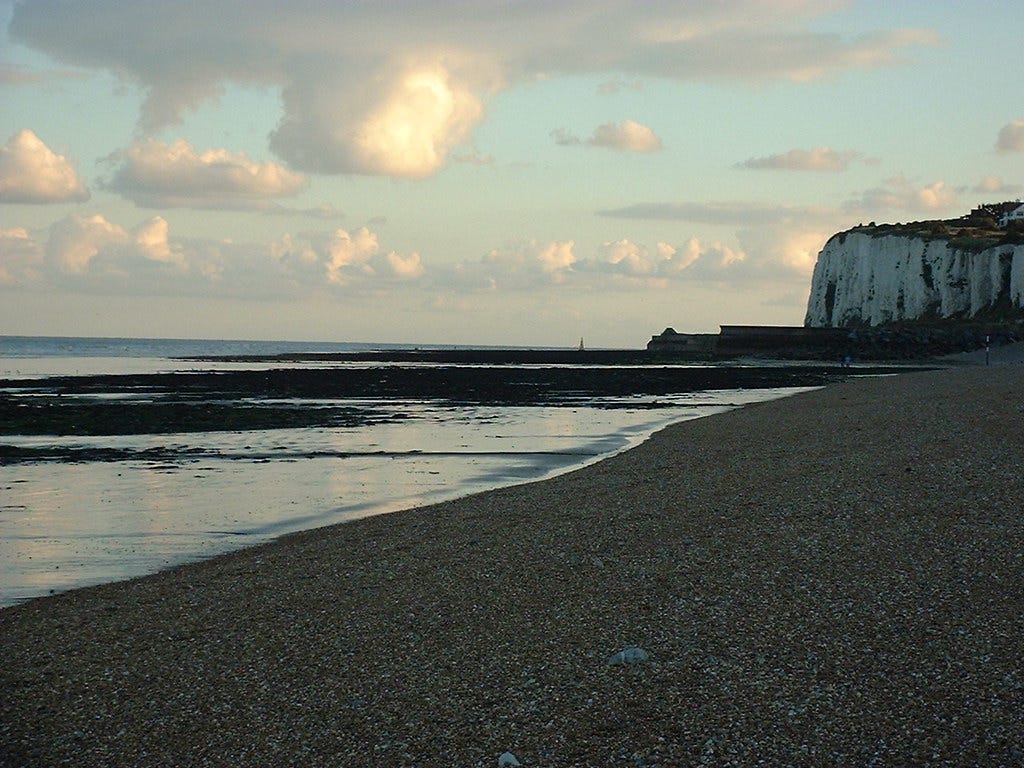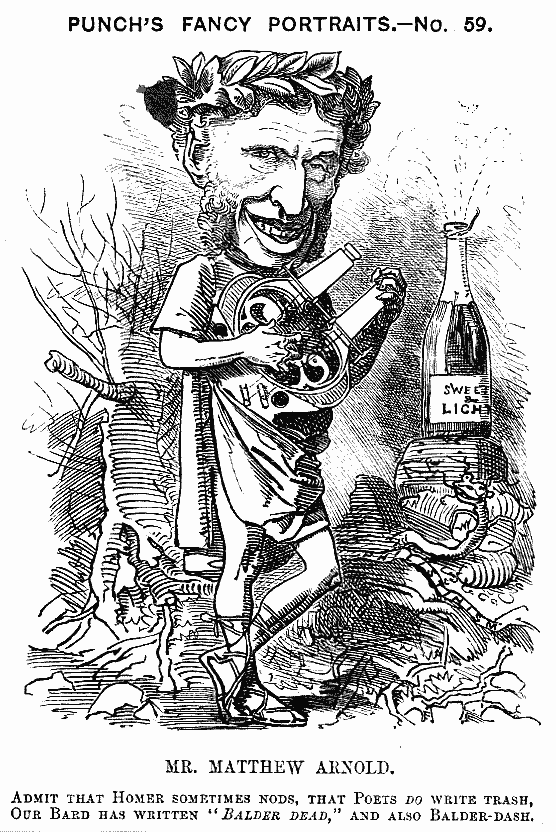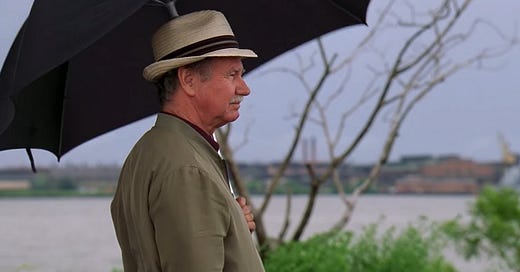
Born on Christmas Eve 1822, the son of a pious and prestigious headmaster, the poet and cultural critic Matthew Arnold is almost a caricature of the nineteenth century British intellectual, the stiff upper lip made flesh—brilliant, passionate, intense, patriotic, complicated, full of opinion, not unfunny but almost comically solemn, seemingly incapable of having fun, and tragically repressed. All of this is apparent by a short glance at his photo, which shows an avuncular but ugly man, with a broad forehead, large nose, crooked but kindly smile, oddly parted and pomaded coiffure, and facial hair that resembles neglected landscaping at the world’s worst office park. He kind of looks like Shrek.
In his twenties, Arnold spent time on the Continent, where he waxed as libertine as Victorian mores and his own reserved nature would allow. He hung out with the novelist George Sand, whose work he much admired; followed the legendary actress Rachel Félix around Paris like an incel groupie, catching every one of her theatrical performances; and, in Switzerland, fell madly in love with a girl named Marguerite, whom he saw as the Beatrice to his Dante, and who, some scholars believe, was a figment of his wild imagination and did not really exist. When he came home from these travels, he got a job as an inspector of schools, got married (not, to his dismay, to Marguerite), settled down, had six children, and wrote about high-minded things until he died of a sudden heart attack at age 65. All of this informs his poetry, which teems with melancholy, loss, frustrated love, sentimentality, nostalgia, high-minded literary allusion, and a generally negative view of humanity. We can sum it up thus: “I was denied my Marguerite, therefore the world is unfair and heartless, there is no God, and I shall hurl myself into the abyss. Woe is me!”
Arnold was big on woe.
He was also big on what he considered the superior culture of antiquity. This led to his being lampooned by the day’s wits. One of his longer and more forgettable poetical works, “Balder Dead,” concerns the life of Balder, the titular figure of Norse mythology. In 1881, while he was very much still alive, the satirical weekly Punch—the MAD Magazine of its day—published a funny caricature of Arnold with a little teasing poem of their own:
Admit that Homer sometimes nods,
That poets do write trash,
Our Bard has written “Balder Dead,”
And also Balder-dash.
But for all of that, “Dover Beach,” Arnold’s best-known work, is deservedly on the short list of the most famous, and the finest, poems in the English language—not just of the nineteenth century, but ever. The poem has bored into me; there are certain phrasings he uses that pop into my head at random moments, as I’m puttering around the house, doing the dishes and whatnot. Even so, I am of two minds about what he’s saying here, as I shall explain.
The poet begins, simply enough, by setting the scene. It is night, and he—and there’s not much doubt that the narrator of the poem is Arnold himself—is by the sea, in a house at the beach by the White Cliffs of Dover. The tide is high, the reflection of the moon visible in the tranquil water. Across the Strait of Dover is Calais, in France; the night is clear enough that he can see lights gleaming in the distance twenty miles away:
The sea is calm tonight.
The tide is full, the moon lies fair
Upon the straits; on the French coast the light
Gleams and is gone; the cliffs of England stand,
Glimmering and vast, out in the tranquil bay.
Oh, and he is not alone in the room:
Come to the window, sweet is the night-air!
In real life, Arnold spent his honeymoon at Dover Beach. That was in 1851, the same year he wrote the poem (it wasn’t published until 1867.) So there he is with his lady, beckoning her to look out the window and breathe in the sweet night air. Which you’d think would be, like, a romantic and happy moment—but no, it isn’t, because Matthew Arnold is a Dour Mary:
Only, from the long line of spray
Where the sea meets the moon-blanched land,
Listen! you hear the grating roar
Of pebbles which the waves draw back, and fling,
At their return, up the high strand,
Begin, and cease, and then again begin,
With tremulous cadence slow, and bring
The eternal note of sadness in.
That last line comes out of nowhere, like a sudden tall wave knocking you backwards into the wet sand. That’s one of the phrasings that pops into my head now and then, apropos of nothing: the eternal note of sadness. As soon as he gives it voice, we can almost hear it, a low rumble, like the down-bow of a cello ever-so-softly on the C2.
In his work, Arnold often uses the vastness of the ocean to symbolize loneliness and isolation. On the other side of the Strait of Dover, we may recall, is the forsaken love of his life, the possibly fictitious, my-girlfriend-lives-in-Canada Marguerite. Whatever initially triggers him, be it the sweet night air or the sound of the surf, our poet interprets what to most of us would be a lovely, intimate scene between two newlyweds as not just sadness, but sadness that never ends.
Chesterton wrote that, even in Victorian England, a time and place not much known for its levity, Arnold was “perhaps the most serious man alive.” So we should not be surprised when, after totally ruining the nice moment with his companion at the beach house with his tedious brooding, he compounds the faux pas by bringing up Greek tragedy:
Sophocles long ago
Heard it on the Ægean, and it brought
Into his mind the turbid ebb and flow
Of human misery; we
Find also in the sound a thought,
Hearing it by this distant northern sea.
How many humans, I wonder, while walking on the beach, look out at the waves and immediately think of human misery? I’m not even sure Sophocles was that morbid—and that Hellenic wet blanket wrote a play about a ill-fated dude who killed a man that wound up being his father, married a woman that wound up being his mother, and was so upset when he found out that he gouged out his own eyeballs.
Next, we come to the stanza where Arnold catastrophizes his own depression. It’s not just him who’s on a downward spiral, you see. The whole world is going down the toilet, and it saps his faith in humanity:
The Sea of Faith
Was once, too, at the full, and round earth’s shore
Lay like the folds of a bright girdle furled.
But now I only hear
Its melancholy, long, withdrawing roar,
Retreating, to the breath
Of the night-wind, down the vast edges drear
And naked shingles of the world.
There’s another line that sticks with me: melancholy, long, withdrawing roar. But the fourth stanza is the poetical money shot. This part is why “Dover Beach” is in all the anthologies:
Ah, love, let us be true
To one another! for the world, which seems
To lie before us like a land of dreams,
So various, so beautiful, so new,
Hath really neither joy, nor love, nor light,
Nor certitude, nor peace, nor help for pain;
And we are here as on a darkling plain
Swept with confused alarms of struggle and flight,
Where ignorant armies clash by night.
For a long time, I read the “let us be true” line as hopeful, where “true” means what it means when it modifies the word “love.” But then I realized I was wrong. He means “true” as in “brutally honest.” What Arnold’s really saying is, “Look, babe, let’s not bullshit each other.” And then: “I know it seems lovely that we are here in this beach house on this moonlit night, listening to the sound of the ocean that’s so relaxing, years from now Sharper Image will make it a standard setting on their noise machines. But I’ve taken the red pill, you see, and I know that’s just an illusion. In reality, the world is a dark, cruel, awful place, and we are all fucked.”
This poor sap is so deathly serious, he can’t even stop contemplating the sad decline of the world while on his honeymoon. This is depressing stuff, made more urgent when we remember that as he unleashes his litany of dread and despair, he is close enough to the White Cliffs of Dover to hurl himself off them.
“Dover Beach” is a young person’s poem, filled with the same urgent desperation that animates Romeo and Juliet (the characters, not the play itself). Rejection, disappointment, bracing reality check: these are things that break one’s spirit. It’s charming that in 1851, young men thus aggrieved were moved to write timeless poems about their woe, instead of subscribing to Joe Rogan’s podcast, attacking women on social media, and becoming neo-Nazi meme-lords.
And, needless to say, those last eight lines are, alas, all too relevant to the current climate in the United States—a country Arnold much admired, incidentally. We may as well swap “America” for “this world” in the final stanza. Our second largest city and cultural capital is on fire, our media has willfully rejected truth, our so-called leaders have capitulated one by one to the returning despot, and we await the coming of Trump Redux a week from tomorrow.
It’s not just at night when the ignorant armies clash.
But what makes Arnold so fascinating is that he changes. He evolves. The lovelorn bard of gloom and doom switches from poetry to prose, and in so doing, finds his capacity to hope and rekindles his faith in humanity. He became a cultural critic—and not of the kind that our contemporary young American men so heartbroken might become. In a land of snobbery and class division, he was a staunch proponent of democracy, and he correctly saw that inequality—in terms of income, class, or sex—would be the undoing of Britain.
“What a strange religion, then,” Arnold writes in an 1860 essay, “is our religion of inequality!” The rigidity of the British class structure he rightly sees as an obsolete artifact from a bygone age, and the root of all problems:
[T]he great inequality of classes and property, which came to us from the Middle Age and which we maintain because we have the religion of inequality…has the natural and necessary effect, under present circumstances, of materialising our upper class, vulgarising our middle class, and brutalising our lower class. And this is to fail in civilisation.
In other words, the compulsion by the rich and powerful to maintain the ridiculous caste system engenders more greed and consumption by the aristocrats, a bourgeoisie growing coarser and cruder and nastier, and the poor bearing the brunt of the bloated plutocrat’s avarice. As Arnold correctly notes, “the greater the inequality the more marked is its bad action upon the lower and middle classes.” This is, of course, the kind of rigid class structure our current crop of artless American oligarchs, too many of whom came of age in the rigid and racist class structure of Apartheid South Africa, wants to bring back. Insofar as “Make America Great Again” means anything, that is what it means.
“The remedy,” he makes plain, “is social equality.”
Ever the aesthete, Arnold was also a staunch believer in culture. To him, culture was not just the hallmark of civilization; it was the entire point of civilization. Corroded culture he sees as a symptom of social inequality. The effete and “materialized” patrician class, he asserts, in that same essay, cannot “have any serious and fruitful sense for the power of beauty.” The Victorian equivalents of the Trumps and the Zuckerbergs and the Musks “may imagine themselves to be in pursuit of beauty; but how often, alas, does the pursuit come to little more than dabbling a little in what they are pleased to call art, and making a great deal of what they are pleased to call love!”
Ouch!
Culture, Arnold believed, derives from “the love of perfection.” Culture, he writes in Culture and Anarchy, with italics his, is “a study of perfection,” and all art is generated by the artist’s “pursuit of perfection”—which is, when you get right down to it, “the pursuit of sweetness and light.” He continues: “He who works for sweetness works in the end for light also; he who works for light works in the end for sweetness also. But he who works for sweetness and light united, works to make reason and the will of God prevail.”
By contrast, Arnold argues—and he may as well be calling out Trump, Musk, and the artless MAGA by name—“he who works for machinery, he who works for hatred, works only for confusion. Culture looks beyond machinery, culture hates hatred; culture has one great passion, the passion for sweetness and light. It has one even yet greater!—the passion for making them”—that is, sweetness and light; that is, kindness and truth—“prevail.”
While writing this “Sunday Pages,” I realized that I have misremembered one of the last lines of “Dover Beach.” I thought it was And we are here alone on a darkling plain, where “darkling” is a fancy way of saying “dark and growing darker.” But it’s actually And we are here as on a darkling plain. In Arnold’s darkling view of the world, joy and love and light and certitude and peace and the relief of pain do not—like Marguerite, perhaps—exist. But the one word he never uses is alone. The plain may be darkening, the confusion sweeping, the clashing armies of ignorance and artlessness and stupidity and hatred causing the rest of us to struggle and flee. But it’s we who are here on that plain. We, all of us good guys. We are not alone. And we will be true to one another.
And if we rewind the poem and read it again, keeping all this in mind, we understand that the sea remains calm and the night-air sweet. The eternal note of sadness we let in can also be let out. The tide that withdraws also returns, replenishing the Sea of Faith. And if we stay together, the ignorant armies will expend all their energy attacking one another, and the world really can and will be new and beautiful and various, full of unironic sweetness and light: a land of dreams.
ICYMI
Nadine Smith was our guest co-host on The Five 8, joining Stephanie Koff. The guest was Yours Truly:
P.S.
I’m thinking of Los Angeles, a city I love, where so many of my friends live, and I struggle to even process the full extent of the horror. The images of the fires boggle the mind. This feels like the modern-day equivalent of the Library of Alexandria burning down, but on a grander scale. My heart just breaks. I don’t even know what to say, other than to send my love to the people of LA, and my prayers up to the Almighty. Please know you are in my thoughts.
Photo credit: Basswulf. View along Dover Beach near Deal.

















‘the news: everything is bad.
poets: okay, but what if everything is bad and we still fall in love with the moon and learn something from the flowers.’
Thank goodness for the poets ❤️
May 7, 2024, was the 200th anniversary of the premiere of Beethoven’s 9th symphony. I’d be willing to make a time capsule bet that come May 7, 2224, people will still be listening to the 9th, while at the same time Musk, Zuckerberg, and yes, even Trump, are barely footnotes. So I’m down with Arnold on culture.